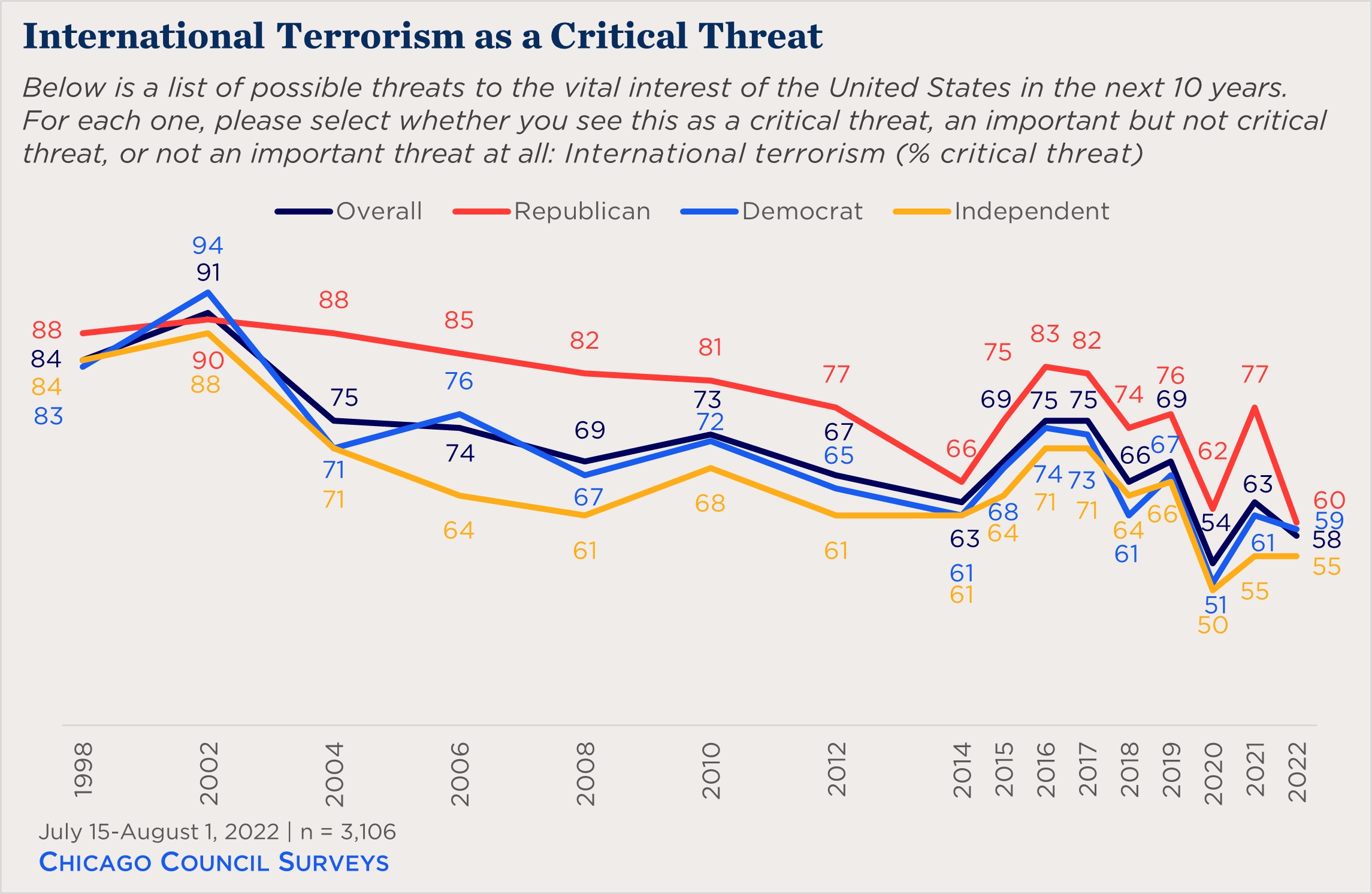In 2002, nine in 10 Americans saw international terrorism as a critical threat. About six in 10 do today, Council polling shows.
Key Findings
- Nearly six in 10 Americans (58%) classify international terrorism as a critical threat to the United States.
- Equal portions of Republicans (60%), Democrats (59%), and Independents (55%) classify terrorism as a critical threat.
- While the perceived threat posed by international terrorism has declined significantly over the last two decades, it still remains a top concern in the minds of Americans compared to other potential international threats.
In the 21 years since the September 11 attacks against the World Trade Center and the Pentagon, American concern about international terrorism has declined significantly.
At its highest point in 2002, nine in 10 Americans considered international terrorism a critical threat to the United States. Being just a year out from the September 11 attacks, such wide concern was understandable. Today, a majority of Americans still describe international terrorism as a critical threat, but at much lower levels than in the past. In the past three years, Americans have hit their lowest levels of threat perception since the Council began polling on this topic (58% in 2022; 54% in 2020).

In part, this concern has lulled because there has not been an international terrorist attack in the United States in a number of years. Also, Americans seem to think that the policies that the US government put in place since 2001 have been effective. Additionally, other concerns have overtaken international terrorism in recent years, such as the COVID-19 pandemic (just 32% in 2002, but 65% in 2021 and 67% in 2020). And finally, Chicago Council polling shows that Americans are more apt to express concern about internal (82%) versus external threats (17%), including home-grown violent extremist groups.
While Americans’ concern about international terrorism has declined considerably in recent years, it is still seen as more threatening than a number of other issues asked about on this year’s Chicago Council Survey, including climate change (54% critical threat) and China’s territorial ambitions (52%). Only a potential disruption in energy supply (62% in 2022), and Russia’s territorial ambitions (60% in 2022) were perceived as more of a critical threat by Americans.
Despite declining concern over international terrorism, the memory of the September 11 attacks still affects everyday Americans. When asked in 2021 to evaluate how much impact major events of the last two decades had on them personally, Americans ranked the terrorist attacks of 9/11 second (21%) only behind what was then the immediate concern, the COVID-19 pandemic (50%). And nine in 10 Americans said they remember exactly what they were doing and where they were at the time of the attacks.





Related Content
 Public Opinion
Public Opinion
On the 20th anniversary of 9/11, new polling finds that Americans still see international terrorism as a critical threat.
 US Foreign Policy
US Foreign Policy
Susan Glasser, Ryan Heath, and Ed Luce join Ivo Daalder to discuss what went wrong and what went right for US foreign policy after the September 11 attacks.
 Public Opinion
Public Opinion
A recent Council Survey finds that the American public considers international terrorism to be the most critical threat facing the nation.
 Public Opinion
Public Opinion
Coinciding with the rise of the Islamic State, public concern about Islamic fundamentalism as a critical threat is rated at 55 percent, the highest level since 2002 survey results.
